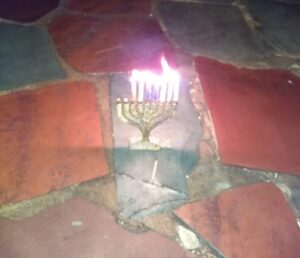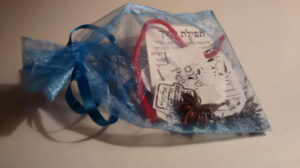 Ruach HaYam teaching presented by Penina Weinber
Ruach HaYam teaching presented by Penina Weinber
Picture is a photo of a small hannukiah lit in the midst of a great cold wind on the cobblestone front porch of an empty house on a Maine beach on the 6th day of Hanukkah in 2019.
No, we’re not at Hanukkah yet, but we are at the Jewish calendar date 3 Kislev, the beginning of the month in which Hanukkah falls, and the darkest month of the year. We are two days after the new moon of Kislev. We can take hope in candles lit against the darkness. We are also at Parashat Toldot, Genesis 25:19-28:9, wherein Rebecca makes the most existential cry of the entire Torah, and Jacob and Esau fight against the gender roles assigned them at birth, reversing them with the support of the Divine and Rebecca. And we’re at Transgender Day of Remembrance. As Jill Hammer writes below, we are in a time of introspection and outward action. We’ll talk about the texts, about Judith and Rebecca, about gender roles, and about how to bring light into darkness.
Jill Hammer’s book The Jewish Book of Days: A Companion for All Seasons situates each day of the year in its season, quarter, phase, and part of nature. Jill writes this about Kislev, in ancient Israel:
“Once the new moon was announced, bonfires were lit in the hills above Jerusalem. Far-flung communities would see the bonfires and light their own, until all the Jewish communities knew that the new moon had come. As stars help a ship locate itself on the sea, the bonfires helped Jews locate themselves in time, joining them to the root consciousness of their people.
According to Rabbi Judah, the 1st of Kislev is the first day of winter in Israel (Babylonian Talmud, Bava Metzi’a 106b). We are close now to the darkest days of the year, and the new moon bonfires remind us of the Hanukkah candles growing each night. The flames teach that when the moon is dark, we can expect its face to shine again, and when the sunlight is dimming, soon it will begin to grow again. This is true also for us: The quiet of introspection can and should lead to outward action in the world.”
Penina Weinberg is an independent Hebrew bible scholar whose study and teaching focus on the intersection of power, politics and gender in the Hebrew Bible. She has run workshops for Nehirim and Keshet and has been teaching Hebrew bible for 10 years. She has written in Tikkun and HBI blog, and is the leader and founder of Ruach HaYam.
*** Ruach HaYam https://www.facebook.com/groups/Ruach.HaYam/ study sessions provide a queer Jewish look at text, and are welcoming to LGBTQ+ and allies, to any learning or faith background, to all bodies, and friendly to beginners***


